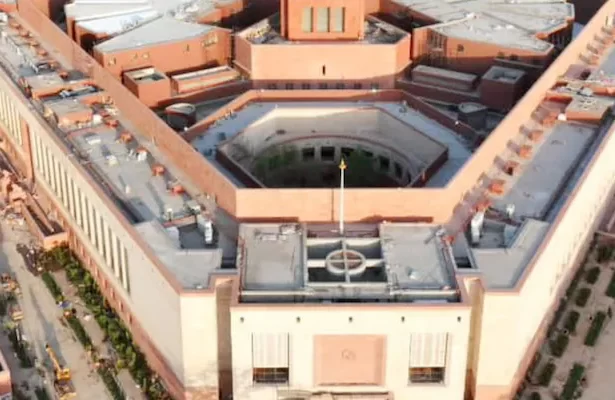The Parliament Winter Session is set to take place from November 25 to December 20, with a significant focus on celebrating the 75th anniversary of the adoption of the Indian Constitution, also known as Constitution Day, on November 26. Parliamentary Affairs Minister Kiren Rijiju announced the session’s dates on X, highlighting that the event will include a commemorative session held in the Central Hall to honor this milestone in India’s democratic history. In addition to this celebration, the Winter Session will see intense discussions on pressing legislative matters, including proposed amendments to the Waqf Bill and the highly debated ‘One Nation, One Election’ proposal.
Parliament Winter Session, Constitution Day Celebration on November 26
Marking Constitution Day on November 26, a day after the Winter Session begins, will allow the Parliament to reflect on the historical adoption of the Indian Constitution. This milestone serves as a reminder of the principles that guide the nation, including justice, equality, and liberty. The Constitution Day event in the Central Hall will not only celebrate the 75th anniversary but also recognize the enduring legacy of India’s founding leaders and their vision for a democratic, secular, and inclusive society.
The 75th anniversary of the Constitution’s adoption symbolizes India’s journey of self-governance and democratic development since gaining independence. Parliamentarians will have the opportunity to pay homage to the framers of the Constitution and to discuss ways to further strengthen India’s democratic framework.
Key Legislative Agendas for the Winter Session
Beyond the celebrations, the Winter Session will tackle significant legislative agendas. Key bills, such as amendments to the Waqf Bill and the ‘One Nation, One Election’ proposal, are expected to dominate the discussions.
Amendments to the Waqf Bill
The proposed amendments to the Waqf Bill have been under consideration by a Joint Parliamentary Committee (JPC), chaired by BJP member Jagadambika Pal. These amendments have generated considerable debate and controversy within the committee. Opposition MPs recently raised concerns about the committee’s functioning, alleging that the chairman made unilateral decisions on meeting schedules and consultation procedures. This led to a formal complaint to the Lok Sabha Speaker, where opposition members warned they may dissociate from the committee if their concerns are not addressed.
The amendments to the Waqf Bill are viewed as critical by the ruling government, which has indicated a desire to streamline management and administration of Waqf properties across India. In a recent statement, Union Home Minister Amit Shah hinted that the amendments could be tabled and possibly passed during the Winter Session. However, opposition MPs argue that the proposed changes could have significant implications and are calling for broader consultations before moving forward.
The controversy surrounding the JPC highlights the heightened scrutiny this bill is likely to face once introduced in Parliament. The JPC’s report is expected to be presented by November 29, and the subsequent debate will provide a platform for both ruling and opposition parties to discuss the potential impact of these amendments on Waqf properties and minority rights.
The ‘One Nation, One Election’ Proposal
The Parliament Winter Session will also address the much-anticipated ‘One Nation, One Election’ proposal, a policy advocated by the BJP in its 2019 election manifesto. The proposal, which aims to hold simultaneous elections for both the Lok Sabha and state assemblies, has faced significant opposition. A committee chaired by former President Ram Nath Kovind submitted a report earlier this year, outlining a possible path forward for this ambitious electoral reform.
Proponents of the ‘One Nation, One Election’ proposal argue that it could save considerable resources, reduce election fatigue, and ensure more efficient governance by synchronizing electoral cycles. However, opposition leaders have raised constitutional concerns, warning that simultaneous elections may infringe on the autonomy of state governments and disturb the federal structure established by the Constitution.
The proposal’s critics argue that the move could disproportionately favor national parties, weaken regional representation, and undermine the autonomy of states. With both supporters and opponents firmly entrenched in their positions, the debate over this proposal is expected to be one of the highlights of the Winter Session. Parliament will have to address not only the logistics of implementing such a system but also the legal and constitutional hurdles that may arise.
Political Context: Impact of Recent State Elections
This Parliament Winter Session follows a series of high-stakes state elections, adding a layer of political intensity to the parliamentary proceedings. Of particular interest is the outcome of the Jammu and Kashmir elections, which marked the first assembly election in the region in over a decade. In a major political shift, the BJP finished behind the National Conference-Congress alliance, underscoring the challenges it faces in Jammu and Kashmir.
The BJP managed to secure a historic third consecutive term in Haryana, solidifying its influence in the state. Meanwhile, elections in Maharashtra and Jharkhand, scheduled just before the Winter Session, could further impact the discussions in Parliament. In Maharashtra, the BJP is allied with factions led by Eknath Shinde and Ajit Pawar, while in Jharkhand, Hemant Soren’s Jharkhand Mukti Morcha remains a part of the Congress-led INDIA bloc. The outcomes of these elections may shape the tone of the Winter Session, as lawmakers bring state-level issues and alliances into the national spotlight.
Other Legislative Business and Expected Debates
The Parliament Winter Session traditionally sees discussions on a range of social, economic, and policy issues. In the previous Monsoon Session, the Union Budget was presented, and topics such as landslides in Wayanad, Kerala were addressed. Given the ongoing socio-economic challenges, it is likely that this session will also feature debates on pressing national issues like inflation, employment, infrastructure development, and climate resilience.
Finance Minister Nirmala Sitharaman is expected to present additional financial updates and address questions on the country’s economic performance. The government’s policies on public welfare, healthcare, and agriculture are also anticipated to be discussed, providing Parliament with an opportunity to address the public’s concerns and grievances.
The Parliament Winter Session promises a dynamic mix of commemorative events and crucial legislative debates. The Constitution Day celebration on November 26 will honor India’s foundational principles, providing an opportunity to reflect on the nation’s democratic achievements over the past 75 years. The proposed amendments to the Waqf Bill and the ‘One Nation, One Election’ proposal will take center stage, fostering debates on the future of India’s democratic framework and governance.
With the backdrop of recent state elections, this session will serve as a platform for both the ruling government and opposition parties to outline their vision for the country. As the session unfolds, the nation will be closely watching how these debates shape India’s political landscape and legislative priorities for the coming year.


